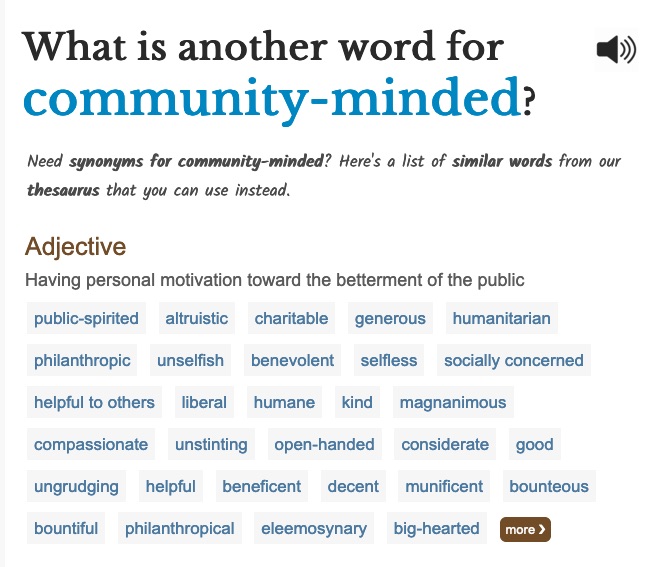In times of crisis people are motivated to watch out for themselves. We’re hardwired to survive. It’s a primal reaction for self preservation. When there is a threat, the instinct is intense.
On the other hand, humans have evolved to value community. This is the recognition that we are interdependent; my survival depends upon a group on whom I rely. Our willingness to work for the greater good operates in tandem with selfish motivations. The Dalai Lama calls this being “wise selfish”. Interdependence – the web of dependent links that we have created through social arrangements (business, government, formal and informal) is being put on display right now. One change leads to another. What other conclusion is there but, “we’re all in this together”.
I’m going to sidestep the debate about whether we are more selfish or community minded. Most of us exercise different instincts depending on prevalent conditions; including personal, generational, and situational. A crisis (especially of this scale) is a situation that calls people to step up and do their best for themselves AND their community. The crisis calls us, motivates us, to do our best work in the service of our community. The question is, are we addressing the most critical needs of people who are most critical to OUR survival?

Healthcare on the brink
The people who are carrying this crisis at the moment are the health care workers and support staff on the front lines. Are we doing enough to support their work.? Since 9/11 we have legitimately paid homage to our firefighters and first responders. I doubt that much money has flowed to them but they have been honored as critical members of our community. Many of us have the same admiration and appreciation for the hospital staff but there is real concern that they are not getting the tangible resources that they deserve (to serve our community). Reports abound on this topic. We are risking the lives of our health care workers at this very moment. Losing them to the virus or to burnout is not only criminal but irrational.
“In the area of testing we are still not creating capacity and applying it to the people most in need. So we have health workers who are symptomatic who can’t get a test. They don’t know if they should go in or not go in. And yet we have lots of testing given to people who are not symptomatic.” – Bill Gates – March 24, 2020.
The essential missing resources are: 1. Adequate Staff, 2. Tests to determine when a staff member is infected, 3. Protective gear, 4. Ventilators, 5. Space for people who are infected (ICU and quarantine) and space for those who are not infected but require medical help.
The economy unraveling
Reading current economic forecasts, opinions vary, but the majority of economists describe an increasing drop in consumption related to unemployment related to sheltering for safety due to the increase in Covid-19 infection and death rates. While some sectors have remained in business and others may find ways to work safely, we are in the early stages of understanding what is safe. Testing, when it becomes widespread, will be a legitimate tool to chart a safe economic response. As reliable information (who is infected, how is it spreading, what regions require support) is available, I expect the creative and entrepreneurial instinct of people will find ways to provide service and build novel businesses. An economic rebound will rely on this creativity and on government to support their initiatives.
It is safe to say that the coming days will require sacrifice. No matter how long this pandemic persists, we will have to navigate the mysteries and perils of Covid infection while picking up the pieces of the world economy. While everyone agrees that we need to be strategic the way we manage the economy, there are already major disagreements on who comes first. Expect a repeat of the debate leading to the 2 trillion dollar bill that was just passed. Money for people, small business or corporations?
“This is why governments are now responding on a massive scale. In addition to the magnitude of policy response, governments need to get their focus right, targeting effectively to support the most vulnerable links in the economy. What has been announced so far is just the beginning–there will be much more to come.” – Forbes
Triage for the economy
The question is what are the most vulnerable links. Is it the unemployed, small business, healthcare (including preparation for repeated infections), or corporations? Will we assume that corporations are most important to economic recovery? Will we feel compelled to compensate them for their losses. Or should we support the poor, the middle class, small and medium sized business? All of us have lost, to greater or lesser degrees. How to we rebuild our community of services?
We can hope that conditions will not be as dire as I have described but it is safe to say that we will be facing a recovery, the likes we have not seen since the depression. Granted it will be different than the depression of the 30s but policies will need to be aimed at jobs, unemployment, housing, health care and other basic human services. It is safe to say that we won’t have as much “disposable” income (what a horrible term) on the other side of this crisis and that people will need support for housing, education, and health care to name a few.
As the dust settles and we emerge from our shelter in place, the question will remain – Can we resist selfish (individualistic) impulses and respond a community-minded fashion?
